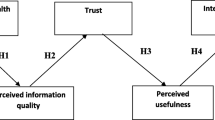Abstract
During a web search, the search engines provide relevant pages while the users decide the usefulness of them. The usefulness assessment has been found to be related to various factors. In this study, the effects of task domain and task type on webpage usefulness assessment were investigated. The two task domains involved were health and travel and the two task types were fact finding and decision making. In an experimental environment, 24 participants were asked to do internet search on 4 pre-defined tasks. In the interview after each search task, the users were asked to evaluate the usefulness of each web page they had clicked and talked about why the page was evaluated as such. According to the results of the experiment, we found that the task domain, task type, and various other factors had impacts on the usefulness assessment during web search.
Access this chapter
Tax calculation will be finalised at checkout
Purchases are for personal use only
Similar content being viewed by others
References
Barry, C.L.: User-defined relevance criteria: an exploratory study. J. Am. Soc. Inform. Sci. 45(3), 149–159 (1994). https://doi.org/10.1002/(SICI)1097-4571(199404)45:3%3c149:AID-ASI5%3e3.0.CO;2-J
Borlund, P.: The IIR evaluation model: a framework for evaluation of interactive information retrieval systems. Inform. Res. 8(3), 152 (2003). http://informationr.net/ir/8-3/paper152.html
Chu, H.: Factors affecting relevance judgment: a report from TREC Legal track. J. Documentation 67(2), 264–278 (2011). https://doi.org/10.1108/00220411111109467
Crystal, A., Greenberg, J.: Relevance criteria identified by health information users during web searches. J. Am. Soc. Inform. Sci. Technol. 57(10), 1368–1382 (2006). https://doi.org/10.1002/asi.20436
Freund, L.: A cross-domain analysis of task and genre effects on perceptions of usefulness. Inf. Process. Manage. 49(5), 1108–1121 (2013). https://doi.org/10.1016/j.ipm.2012.08.007
Freund, L., Berzowska, J.: The goldilocks effect: task-centred assessments of e-government information. Proc. Am. Soc. Inform. Sci. Technol. 47(1), 1–10 (2010). https://doi.org/10.1002/meet.14504701261
Kinley, K., Tjondronegoro, D., Partridge, H., Edwards, S.: Relationship between the nature of the search task types and query reformulation behaviour. In: Proceedings of the Seventeenth Australasian Document Computing Symposium, pp. 39–46. ACM, New York, NY, USA (2012). https://doi.org/10.1145/2407085.2407091
Kim, J.: Task as a context of information seeking: an investigation of daily life tasks on the web. Libri, vol. 58, no. 3 (2008). https://doi.org/10.1515/libr.2008.018
Radlinski, F., Kurup, M., Joachims, T.: How does clickthrough data reflect retrieval quality? In: Proceedings of the 17th ACM Conference on Information and Knowledge Management, pp. 43–52. ACM, New York, NY, USA (2008). https://doi.org/10.1145/1458082.1458092
Ruthven, I., Baillie, M., Elsweiler, D.: The relative effects of knowledge, interest and confidence in assessing relevance. J. Documentation 63(4), 482–504 (2007). https://doi.org/10.1108/00220410710758986
Saracevic, T.: The stratified model of information retrieval interaction: extension and applications. Proc. ASIS Ann. Meet. 34, 313–27 (1997)
Scholer, F., Kelly, D., Wu, W.-C., Lee, H.S., Webber, W.: The effect of threshold priming and need for cognition on relevance calibration and assessment. In: Proceedings of the 36th International ACM SIGIR Conference on Research and Development in Information Retrieval, pp. 623–632 (2013)
Taylor, A.: User relevance criteria choices and the information search process. Inf. Process. Manage. 48(1), 136–153 (2012). https://doi.org/10.1016/j.ipm.2011.04.005
Tombros, A., Ruthven, I., Jose, J.M.: How users assess web pages for information seeking. J. Am. Soc. Inform. Sci. Technol. 56(4), 327–344 (2005). https://doi.org/10.1002/asi.20106
Toms, E.G., Freund, L., Kopak, R., Bartlett, J.C.: The effect of task domain on search. In: Proceedings of the 2003 Conference of the Centre for Advanced Studies on Collaborative Research, pp. 303–312. IBM Press, Toronto, Ontario, Canada (2003). http://dl.acm.org/citation.cfm?id=961322.961370
Xie, I., Benoit III, E., Zhang, H.: How do users evaluate individual documents? an analysis of dimensions of evaluation activities. Inform. Res. 15(4), 723 (2010). http://InformationR.net/ir/15-4/colis723.html]
Xu, Y., Chen, Z.: Relevance judgment: what do information users consider beyond topicality? J. Am. Soc. Inform. Sci. Technol. 57(7), 961–973 (2006). https://doi.org/10.1002/asi.20361
Sillence, E., Briggs, P., Fishwick, L., Harris, P.: Trust and mistrust of online health sites. In: Proceedings of the SIGCHI Conference on Human Factors in Computing Systems, pp. 663–670 (2004)
Liao, Q.V., Fu, W.T.: Age differences in credibility judgments of online health information. ACM Trans. Comput.-Hum. Interact. 21(1), 1–23 (2014)
Kourouthanassis, P.E., Mikalef, P., Pappas, I.O., Kostagiolas, P.: Explaining travellers online information satisfaction: a complexity theory approach on information needs, barriers, sources and personal characteristics. Inf. Manag. 54(6), 814–824 (2017)
Toms, E.G., et al.: Task effects on interactive search: the query factor. In: Fuhr, N., Kamps, J., Lalmas, M., Trotman, A. (eds.) INEX 2007. LNCS, vol. 4862, pp. 359–372. Springer, Heidelberg (2008). https://doi.org/10.1007/978-3-540-85902-4_31
Agichtein, E., Zheng, Z.: Identifying “best bet” web search results by mining past user behavior. In: Proceedings of the 12th ACM SIGKDD International Conference on Knowledge Discovery and Data Mining, pp. 902–908. ACM, New York, NY, USA (2006). https://doi.org/10.1145/1150402.1150526
Vakkari, P., Hakala, N.: Changes in relevance criteria and problem stages in task performance. J. Documentation 56(5), 540–562 (2000)
Acknowledgements
This experiment was supported by the research grant awarded by the university’s Graduate Student Association. We also thank all the participants.
Author information
Authors and Affiliations
Editor information
Editors and Affiliations
Rights and permissions
Copyright information
© 2021 Springer Nature Switzerland AG
About this paper
Cite this paper
Sa, N., Yuan, X. (2021). User Assessment of Webpage Usefulness. In: Kurosu, M. (eds) Human-Computer Interaction. Design and User Experience Case Studies. HCII 2021. Lecture Notes in Computer Science(), vol 12764. Springer, Cham. https://doi.org/10.1007/978-3-030-78468-3_30
Download citation
DOI: https://doi.org/10.1007/978-3-030-78468-3_30
Published:
Publisher Name: Springer, Cham
Print ISBN: 978-3-030-78467-6
Online ISBN: 978-3-030-78468-3
eBook Packages: Computer ScienceComputer Science (R0)




